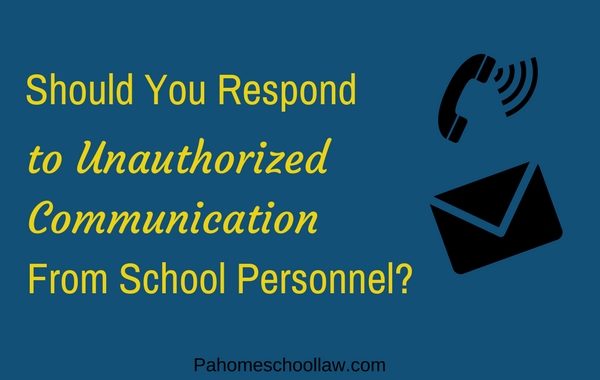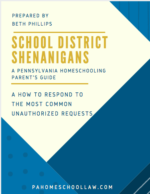You glance at the caller ID and the screen shows a call coming from the local school district. Or you check your inbox and there’s an email from from the school district account. Your face gets flush. Your heart starts racing and your brain goes immediately to the worst-case scenario.
You filed all the paperwork to begin a home education or private tutor program. You’re sure you met all of the requirements. You don’t even want to answer the phone or open the email. What should you do?
This post will help you decide.
When the Pennsylvania homeschool law was amended in 2014, it identified limited circumstances and a precise procedure that a superintendent is required to follow to contact a supervisor of a home education program.
Please note: The homeschool law does not authorize other school administrators or employees to communicate with the supervisor for any reason. However, most districts are either unaware of this or ignore it and it’s common for school nurses, secretaries, pupil services coordinators, school psychologists or other district employees to reach out to supervisors, private tutors and even evaluators.
When Law Authorizes Communication
According to the law, the superintendent is only authorized to contact a supervisor if:
- the supervisor fails to submit an evaluator’s certification by June 30; [24 P.S. §1327.1 (h.1)]
- the superintendent has a “reasonable belief” that an appropriate education is not occurring [24 P.S. §1327.1(i.1)]; or
- the home education program is not in compliance of any other provision of the homeschool law [24 P.S. §1327.1(j.1)].
If a student is in a private tutor program, a superintendent may only inquire about the program is he/she receives a complaint that the student is not being provided instruction for the “time prescribed” or is not making satisfactory progress in the tutoring program. 22 Pa.Code §11.31(b)(3). This post will focus on a home education program.
Certified Letter is Required
In each scenario identified in the law, the superintendent shall send a letter by certified mail, return receipt requested to the supervisor of the home education program. The letter should include the basis for the superintendent’s reasonable belief that an appropriate education is not occurring or that the home education program is out of compliance.
The law outlines the supervisor’s responsibility under each circumstance and the consequences for failure to comply or respond.
It’s important to note that the law does not authorize any other manner of communication (email, phone call or regular US mail) by any other school employee.
Common Practice Disregards Law
School administrators or employees other than the superintendent routinely contact homeschool supervisors by phone or regular mail to request information or action. Often, the information or action requested is not required by the homeschool law.
This puts parents in a difficult position. Should they respond at all since the form of communication and/or the communicator is improper (not from the superintendent and not via certified mail)?
Should they curtly reply that the author or caller has not followed proper procedure without getting into the appropriateness of the request? Will the matter escalate even though the homeschool parent is in the right? These are all questions that are impossible to answer.
It can be intimidating and take a lot more energy to duel back and forth when a matter could be settled by referring an uninformed administrator to a clear provision of the homeschool law or replying that the request is not authorized.
What Should a Supervisor Do?
How and if you respond to an improper (not by certified letter) request by a school administrator other than the superintendent is a personal matter and will likely depend on how distracting or disruptive the matter becomes.
I usually advocate complying without over complying with the law. I also understand that responding when the form isn’t proper perpetuates the improper behavior. However, I don’t blame any parent for responding to a request because it takes less energy and can often settle a matter with one communication.
I can’t tell you how to proceed because it depends on your barometer for nonsense, how much extra time you have and your tolerance for things to go drag on. Consider whether you will you sleep at night either way?
Will you be annoyed with yourself if you reply even if the form isn’t proper?
Will you be a nervous wreck if you ignore the request or insist on the proper procedure from the superintendent?
I completely understand the adrenaline rush when you’re on the other end of any communication with the school district.
In this post, I’ll outline the different ways to approach this predicament.
The Hypothetical
Let’s assume, for purposes of this example that you filed an affidavit with all the required information and attached a proposed list of objectives and a list of immunizations. A secretary calls on your home phone (which was listed on the affidavit) to request that you register your children with the district.
In this scenario, neither the form (phone call), the person (secretary) nor the content (“register with the district”) is authorized by the homeschool law. The trifecta of over-reaching, but pretty common.
Other common requests not required by the homeschool law include identifiying grade level of the students, birthdates, medical records or proof of residency.
Here are your options:
1. Do Nothing
Since the communication was not from the superintendent via certified mail, return receipt requested, you are not legally obligated to respond.
Ignoring the request is easy for some, not so easy for others.
Ignoring the communication is a perfectly reasonable and legal option. It could trigger additional communication or interference. I don’t say that to scare you but to inform you.
2. Respond to the Form, Not the Substance
Another option is to respond by informing the person making the request that the communication does not meet the legal procedure identified in the home education law.
Whether the next communication will be proper is hard to tell. You may be volleying back and forth until the superintendent sends a certified letter with the unauthorized request. In which case, I would advise you to reply in a timely manner as indicated in section j.1 of the homeschool law. Substantively, you can assert your position that the information is not required by the law.
On the other hand, you may not get this request again. Not likely, though.
3. Respond to the Substance
If you decide to put the matter to rest (for now) by informing the person on the other end of the request that the information is not required by the law, I would also let him or her know that the form of the communication is improper and that only the superintendent is authorized to communicate with a supervisor.
If any communication or not replying results in a threat (home visit, truancy charge, etc.), I would respond immediately by phone and email to the person issuing the threat and to the superintendent and reiterate via certified letter addressed to the superintendent, return receipt requested. This is not likely to happen but don’t ignore this type of communication.
If you’re still unsure whether or how to reply to requests by a superintendent or school administrators, this guide will help. It includes sample replies to the most common requests with language straight out of the home education law.


